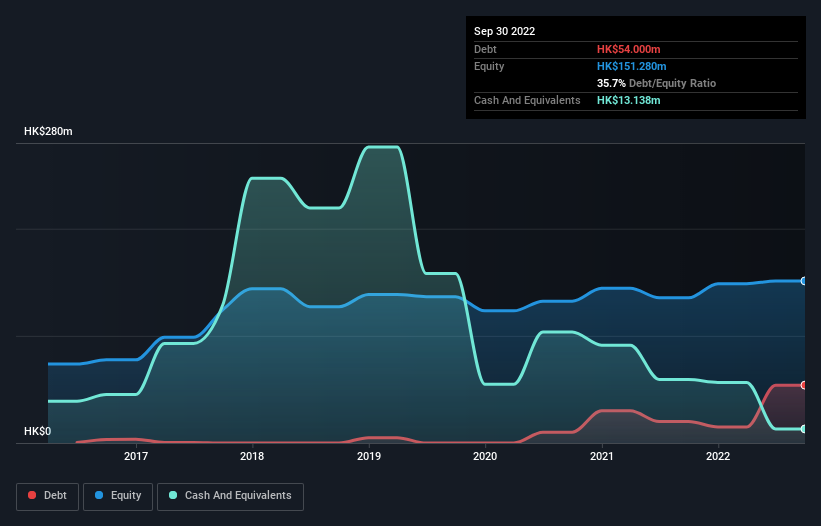- Hong Kong
- /
- Construction
- /
- SEHK:1546
Thelloy Development Group (HKG:1546) Takes On Some Risk With Its Use Of Debt

Legendary fund manager Li Lu (who Charlie Munger backed) once said, 'The biggest investment risk is not the volatility of prices, but whether you will suffer a permanent loss of capital.' It's only natural to consider a company's balance sheet when you examine how risky it is, since debt is often involved when a business collapses. We note that Thelloy Development Group Limited (HKG:1546) does have debt on its balance sheet. But the real question is whether this debt is making the company risky.
When Is Debt Dangerous?
Debt is a tool to help businesses grow, but if a business is incapable of paying off its lenders, then it exists at their mercy. Ultimately, if the company can't fulfill its legal obligations to repay debt, shareholders could walk away with nothing. While that is not too common, we often do see indebted companies permanently diluting shareholders because lenders force them to raise capital at a distressed price. Having said that, the most common situation is where a company manages its debt reasonably well - and to its own advantage. The first step when considering a company's debt levels is to consider its cash and debt together.
View our latest analysis for Thelloy Development Group
What Is Thelloy Development Group's Net Debt?
As you can see below, at the end of September 2022, Thelloy Development Group had HK$54.0m of debt, up from HK$20.0m a year ago. Click the image for more detail. However, because it has a cash reserve of HK$13.1m, its net debt is less, at about HK$40.9m.

How Healthy Is Thelloy Development Group's Balance Sheet?
The latest balance sheet data shows that Thelloy Development Group had liabilities of HK$156.1m due within a year, and liabilities of HK$3.73m falling due after that. Offsetting this, it had HK$13.1m in cash and HK$107.1m in receivables that were due within 12 months. So it has liabilities totalling HK$39.6m more than its cash and near-term receivables, combined.
Thelloy Development Group has a market capitalization of HK$176.0m, so it could very likely raise cash to ameliorate its balance sheet, if the need arose. But it's clear that we should definitely closely examine whether it can manage its debt without dilution.
We use two main ratios to inform us about debt levels relative to earnings. The first is net debt divided by earnings before interest, tax, depreciation, and amortization (EBITDA), while the second is how many times its earnings before interest and tax (EBIT) covers its interest expense (or its interest cover, for short). This way, we consider both the absolute quantum of the debt, as well as the interest rates paid on it.
Thelloy Development Group's net debt to EBITDA ratio of about 2.1 suggests only moderate use of debt. And its commanding EBIT of 38.0 times its interest expense, implies the debt load is as light as a peacock feather. We also note that Thelloy Development Group improved its EBIT from a last year's loss to a positive HK$15m. When analysing debt levels, the balance sheet is the obvious place to start. But it is Thelloy Development Group's earnings that will influence how the balance sheet holds up in the future. So when considering debt, it's definitely worth looking at the earnings trend. Click here for an interactive snapshot.
Finally, a company can only pay off debt with cold hard cash, not accounting profits. So it's worth checking how much of the earnings before interest and tax (EBIT) is backed by free cash flow. Over the last year, Thelloy Development Group saw substantial negative free cash flow, in total. While investors are no doubt expecting a reversal of that situation in due course, it clearly does mean its use of debt is more risky.
Our View
Thelloy Development Group's conversion of EBIT to free cash flow and net debt to EBITDA definitely weigh on it, in our esteem. But its interest cover tells a very different story, and suggests some resilience. We think that Thelloy Development Group's debt does make it a bit risky, after considering the aforementioned data points together. That's not necessarily a bad thing, since leverage can boost returns on equity, but it is something to be aware of. There's no doubt that we learn most about debt from the balance sheet. But ultimately, every company can contain risks that exist outside of the balance sheet. For instance, we've identified 3 warning signs for Thelloy Development Group (2 are significant) you should be aware of.
If, after all that, you're more interested in a fast growing company with a rock-solid balance sheet, then check out our list of net cash growth stocks without delay.
Valuation is complex, but we're here to simplify it.
Discover if Thelloy Development Group might be undervalued or overvalued with our detailed analysis, featuring fair value estimates, potential risks, dividends, insider trades, and its financial condition.
Access Free AnalysisHave feedback on this article? Concerned about the content? Get in touch with us directly. Alternatively, email editorial-team (at) simplywallst.com.
This article by Simply Wall St is general in nature. We provide commentary based on historical data and analyst forecasts only using an unbiased methodology and our articles are not intended to be financial advice. It does not constitute a recommendation to buy or sell any stock, and does not take account of your objectives, or your financial situation. We aim to bring you long-term focused analysis driven by fundamental data. Note that our analysis may not factor in the latest price-sensitive company announcements or qualitative material. Simply Wall St has no position in any stocks mentioned.
About SEHK:1546
Thelloy Development Group
An investment holding company, provides property construction services primarily in Hong Kong.
Slight and slightly overvalued.
Market Insights
Community Narratives



